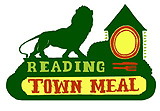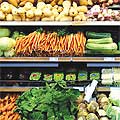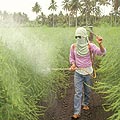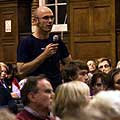Reading Town Meal 2013 Question Time Debate
Food for thought at the first Town Meal debate
The historic Great Hall at University of Reading was filled with enthusiastic questioners who wanted to chew over the subject "Should our food be cheaper?" with our expert panellists.
The first contribution, taken by our MC Vice Chancellor, Sir David Bell, turned the question on its head and asked "shouldn't we be discussing whether our food should be more expensive?" This immediately raised issues for our panel and audience about whether food would be valued more if people had to pay more, and would they waste less?
Carol Wagstaff, from the UoR Centre for Food Security had already reminded us that today in the UK, we spend about 10-11% of our household income on food, which is far less than many countries around the world and compares to over 40% of our income 60 years ago. But, she added, even at today's prices some people on low incomes can't access decent, wholesome food - and there are 'food deserts' in the UK that are dominated by outlets selling poor quality processed products.
Organic farmer, Richard Gantlett, didn't think that higher prices were the key to valuing our food - educating people about our food and how to cook it from scratch, using their own time and hands would result in a greater sense of food as a central part of our lives, not just a commodity to be traded, bought and consumed, or thrown away.
Graciela Romero from campaign group War on Want, didn't think the price of food should be higher, despite the pitiful wages that current prices deliver to many overseas producers. The answer was not higher prices, but to change the system that was dominated by big corporations making big profits and many players all taking their cut - we need regulation to deliver a fairer deal to all.
The character of our current food system raised other audience concerns as to whether intensive, almost industrial systems were necessary to produce affordable food to feed a growing population. Or, are these systems with all the inputs and transport simply unsustainable in the long-term? Quentin Clark from Waitrose said that we needed to look behind the 'headlines' to discover the true environmental impact, for instance intensive dairy production undoubtedly had a lower carbon footprint.
Carol Wagstaff added that massive UK production facilities like 'Planet Thanet' in Kent were probably much more carbon intensive than importing fresh produce from countries where it was in season and could also provide valuable income to them.
However, Richard reminded us that cows naturally eat grass and that is what his organically raised animals consume, whereas intensively reared animals might possibly never see grass out in the open.
Like Richard's cows, the audience were 'chewing the cud' well into the night with many more complicated issues behind a seemingly simple question, so there's much more to come in our full report and video in due course.





